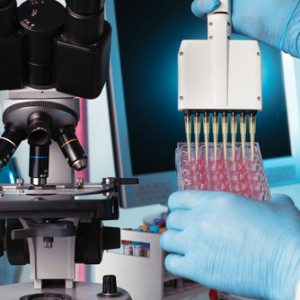 Researchers at the University of Michigan Comprehensive Cancer Center published a study this week that may have direct implications on the future of lung cancer treatment. The study titled “Phosphorylation of FADD by the kinase CK1α promotes KRASG12D-induced lung cancer” was the subject of the cover for the latest issue of Science Signaling. The aims of the study were to understand the mechanisms of how KRAS, a known oncogene (gene that has the potential to cause cancer), becomes cancerous and how to successfully inhibit the cancer-inducing mutations.
Researchers at the University of Michigan Comprehensive Cancer Center published a study this week that may have direct implications on the future of lung cancer treatment. The study titled “Phosphorylation of FADD by the kinase CK1α promotes KRASG12D-induced lung cancer” was the subject of the cover for the latest issue of Science Signaling. The aims of the study were to understand the mechanisms of how KRAS, a known oncogene (gene that has the potential to cause cancer), becomes cancerous and how to successfully inhibit the cancer-inducing mutations.
According to the World Health Organization, lung cancer is the leading cause of death worldwide. The most common type of lung cancer is non–small cell lung cancer (NSCLC), accounting for upwards of 80% of the known cases. Cancer arises from a mutation in a single cell and for a quarter of all NSCLC diagnosed, that mutation is attributable to the KRAS gene. The official name of the gene is the Kirsten rat sarcoma viral oncogene homolog, and its primary responsibilities are to regulate cell division. KRAS mutations were identified as the primary contributors to the cause of NSCLC close to 20 years ago. Despite this knowledge, it has been an almost futile attempt to find either laboratory or pharmaceutical interventions that effectively inhibit mutations caused by KRAS. To circumvent two decades of unsuccessful findings, the study team decided to refocus investigative efforts and look at what was happening to downstream effectors in this cell-signaling pathway.
Their findings showed that phosphorylation (addition of a phosphate molecule) for a specific amino-acid by the Fas-Associated protein with Death Domain (FADD) was only occurring when KRAS was active. FADD plays an active role in cell cycle regulation and apoptosis (cellular death). Using 2 groups of mouse models engineered to have lung cancer; they turned on KRAS and deleted FADD from the mouse’s genome in one group, and then turned on KRAS and left FADD to work normally in the other. The mice in the group with the deleted FADD did not get tumors, despite having active KRAS.
[adrotate group=”3″]
When discussing the importance of the study’s conclusions, corresponding study author Alnawaz Rehemtulla, PhD., Ruth Tuttle Freeman Research Professor of radiation oncology and radiology and co-director of the Center for Molecular Imaging at the University of Michigan Medical School, stated that, “We don’t have effective ways of targeting KRAS directly, so we have to go downstream to attack. This study shows that casein kinase 1-alpha is a bona fide target for treatment of KRAS-mutated lung cancer. Figuring out how KRAS causes cells to divide is important and gives us potential avenues for blocking the downstream activity and inhibiting lung tumor growth.”
For Oncologists and the patients they treat, these findings offer hope for future promising targeted therapies for the high percentage of patients diagnosed with KRAS-mutated lung cancers.

